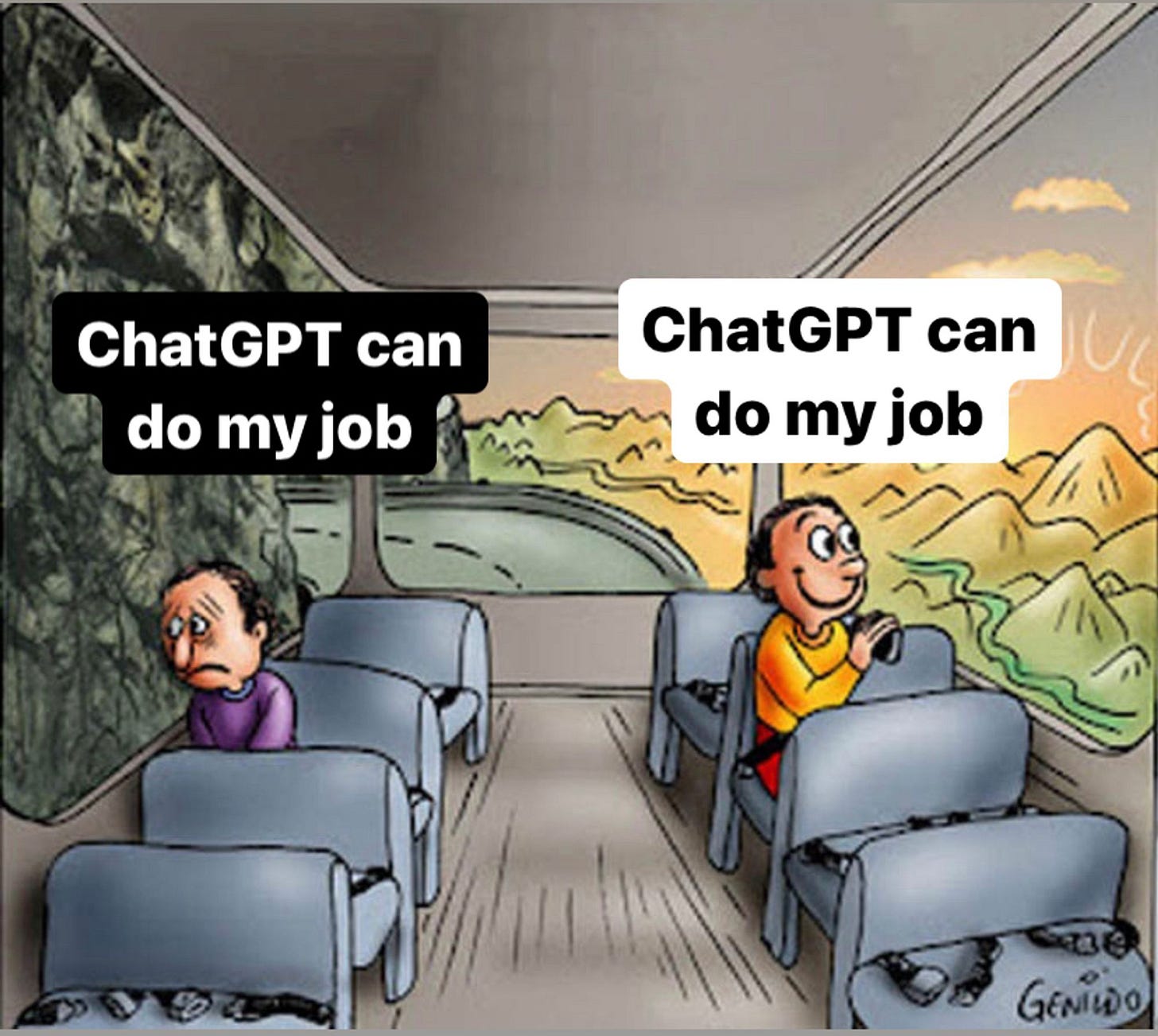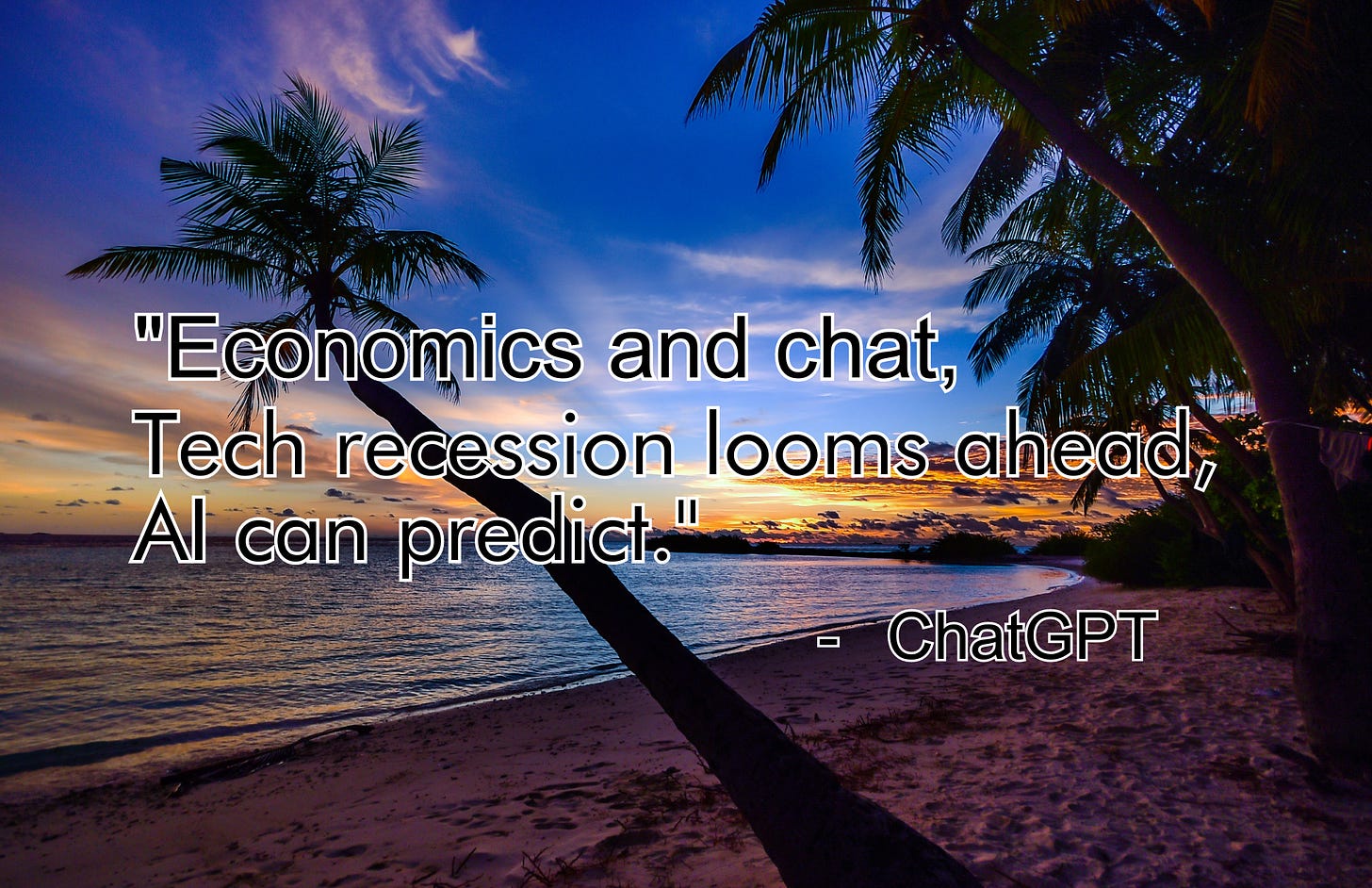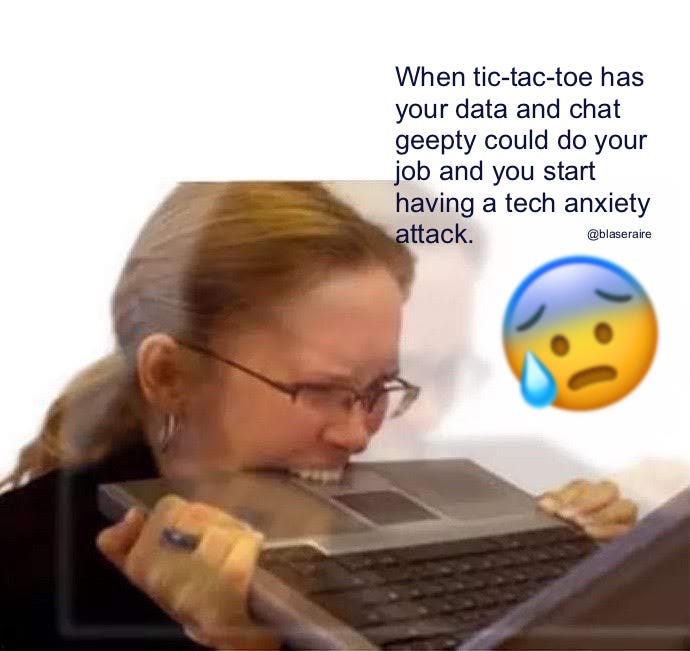The Age of AI Dawns as ChatGPT Slides Into the DMs
Unit 1: Age of AI, Topic 1: Intro to AI
Hello Angel,
A quick note on how to engage with this article.
1. Like a class curriculum, each topic is part of a larger unit that dives into a distinct subject. Think of it like a vinyl record, each topic can be enjoyed as a track or fully experienced like an album. Subscribe to get them weekly in your inbox!
2. No knowledge gatekeeping here! We’re neophytes ourselves, presenting our laywomen’s research from topics that make us curious. If you see a bolded term, it is defined in the glossary at the end of this article.
3. Look out for underlined passages, these are your portal down the knowledge rabbit hole and lead to further reading. Insatiable? Original sources are merchandised on our interactive reference page at the end.
4. This is a *reciprocal* experience! We invite you to contemplate the discussion questions at the back. Or even cooler, forward the topic to a friend, colleague, or your crush and start a meaningful conversation.
Curiously,
Ambi & Abbey
Unless you live in a faraway place with no Wi-Fi or human dialogue - in which case, vibes - you have at this point heard of the rapid adoption of our dear friend (or foe) ChatGPT.
ChatGPT faithfully churns out solutions for both the minuscule and monumental. From mundane daily life tasks, such as crafting a confident email, to more intricate lead prospecting workflows that take human counterparts ages.
For creatives, it has been historically feasible to disassociate from the threat of career obsolescence at the hands of automation. Unlike self-driving cars that are being touted by Tesla today, the labor of critical thinking required to craft a quip in 280 characters (or less!) far exceeds the current capabilities of algorithms. But when the algorithm can churn out a haiku on economics in under 3 seconds, it might be time to reconsider the inalienability of the humanities.
ChatGPT has entered the convo faster than dudes in your DM post-breakup.
With more than 100 million users in a three-month period, ChatGPT is the fastest-growing consumer application in a limited period of time.
For context, it took TikTok nine months to reach this benchmark, Instagram two and a half years, and Facebook almost four.
This isn't because it connects us to share short-form snippets of our favorite hair products or stalk our high school crush's modern-day whereabouts.
ChatGPT is poised to unlock an unprecedented era of productivity.
A virtual assistant of sorts that allows us to offload the BS we've always preferred to not be doing.
With a wave of ChatGPT’s intoxicating magic wand, AI seems to be a barrel we're collectively staring down rather than a far-away Jetsons-esque comp-utopia. Panic rises like a Mentos-and-Coke concoction as looming AI tech casts a dark shadow over a recession.
“What does this level of intelligence mean for us mere mortals and our careers? Are the robots taking over?” Everybody stay f**king calm!
Society is facing extraordinary challenges on almost every front. From water scarcity to data wars, it’s fair to say that we are glaring at threats that require a lot of brain power to solve. And with a lowering birth rate, there’s a growing gap in the amount of sheer attention we’re able to humanly give these issues. This is where AI, which makes it possible for machines to learn from experience, mimicking neural networks of the human mind to problem solve at scale. In this sense, AI has the power to supplement our human experience and confront these challenges head-on, with solutions and support that we might not be able to dream up.
Simultaneously, because AI has the ability to learn on its own, compounding mass amounts of knowledge and refining decisions from there, it could quickly spiral beyond our understanding.
Hallucinations are events when the model will confidently share answers that are wholly made up, are already seeding the ChatGPT platform, often with little awareness from the users.
AI speaks its own language, one that rapidly feasts off of mass silos of data, faster than a sleeve of Oreos disappears ten minutes into a LOTR marathon. Humans don’t have the processing power to keep up with the rapid digestion of machine learning.
If we remember the Internet Bubble (Gen Z, look it up), it’s safe to say we had nary a clue regarding what was in store. That we’d be filing away entire company archives in data rooms or that peer networks swell to the point that we’d “view” the open-faced bagel our ex-coworker ate this morning, was simply not in the collective imagination.
Likewise, we have no idea what an AI future might look like until we are in its midst.
As an AI language model, and as humans, we do not have the ability to predict the future with certainty.
What’s distinguishing between the Internet’s inception and the present day is that AI is snowballing faster than a bowling ball down Everest.
The growth rate is already bordering superhuman. ChatGPT-3 was first released on November 30, 2022. Less than three months later, ChatGPT-4 hit the scene, with the ability to process 25,000 words at once, more than 8x more than its predecessor could handle. The updated model scored in the 90th percentile on the Uniform Bar Exam, while ChatGPT3.5 was sitting in the bottom 10th. How you might ask? In large part, due to the data we’re feeding it by using the platform. It becomes stronger with our human usage. The more in = the more out.
There are major considerations when it comes to AI’s power and how it will change our human lives, looming queries that we don’t even have the vernacular to ask quite yet. To many outside of the tech echo chamber, ChatGPT is a lofty new shiny toy. Few are starting to grasp how the algo can be woven into their lives & transform their careers.
Sam Altman, the CEO of OpenAI has openly admitted, he’s a “little bit scared” of artificial intelligence technology, with the caveat of also being able to “have a much higher quality of life.”
We’re eager to share in Sammy boy’s optimism, but it’s hard not to acknowledge the techno anxieties that arise from OpenAI’s innovations.
Not even artificial intelligence can predict the future, but humans can take solace in knowing that we can still shape what’s ahead. It’s important to chew on the juicier questions so we can take a considered step forward. How do we want AI to shape society? How can we modulate against robots taking over the world? What will happen to those who lose their jobs? And what about future generations? It’s a lot to unpack.
In our next units, we will place ChatGPT in the greater landscape of not only AI but also technical revolutions, to take a more objective look at these questions - as objective as humanly possible.
Discussion Qs:
In what ways can you think of that you interact with AI in your life? (E.g. Alexa, Google Maps, etc.)
How is AI already impacting your industry?
How are you keeping up to date with AI advancements?
Glossary:
Artificial Intelligence (AI): AI is a branch of computer science that focuses on creating machines that are capable of intelligent behavior, such as learning, problem-solving, and decision-making.
AI Hallucination: An AI hallucination is an event when an AI model generates an answer that is completely made up, often without the user's knowledge.
Data Silo: A data silo is where data is stored in isolated systems or databases that are not easily accessible externally.
Internet Bubble: The Internet Bubble was a period of rapid growth and investment in Internet-based businesses in the late 1990s and early 2000s that eventually led to a market crash.
Data Rooms: A data room is a secure virtual space where sensitive documents and information can be stored and shared between parties during a business deal or transaction.
Sources:
OpenAI CEO Sam Altman says AI will reshape society, acknowledges risks: 'A little bit scared of this’ by Victor Ordonez, Taylor Dunn, and Eric Noll
The Social Media Platforms That Hit 100 Million Users Fastest by Natalie Walters
UBS: ChatGPT May Be the Fastest Growing App of All Time by Ben Wodecki








